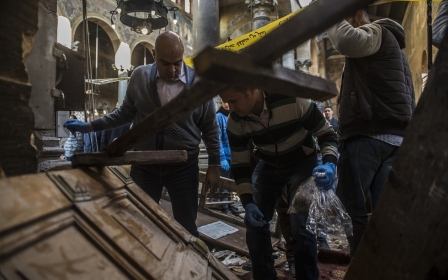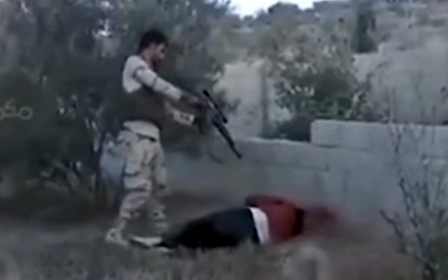'Every adventurer wins pleasure': South Sinai beckons tourists despite IS menace

ST CATHERINE'S, Southern Sinai - The attack came after dark. Firing at a police post from a position in the rocky hills of Sinai, Islamic State militants killed one police officer and wounded four others before disappearing into the night.
The clash on 18 March near St Catherine's monastery in south Sinai was a worrying foray by IS into an area that is usually far outside their operating area.
People have been trying to hurt that monastery for 1,600 years. People make a big thing out of a little one
- Ahmed Saleh, villager
But tourists do not seem to have been discouraged from visiting. Only a few weeks after the attack, groups of Indian, German, Egyptian, Polish and American visitors toured the ancient site nestled in a steep ravine at the foot of Mount Sinai – the place where the Ten Commandments are believed to have been revealed to Moses.
And locals insist that the area is safe. "People have been trying to hurt that monastery for 1,600 years," Ahmed Saleh, a herbalist in the village near the monastery told Middle East Eye.
"People make a big thing out of a little one."
Another attack in south Sinai could be further bad news for the tourist industry in Egypt, which has suffered since the 2011 revolution. Five million fewer arrivals were recorded in 2011 as opposed to 2010, according to World Bank figures.
Those numbers have stayed low amid continuing instability and were further hurt by the downing of a Russian charter flight out of Sharm el-Sheikh in October 2015, killing 224. The attack, claimed by IS, forced the suspension of many direct flights to Sharm and an exodus of foreign tourists.
But while the security situation in the north of the region has steadily deteriorated since the 2011 uprisings, with militants attacks killing hundreds of security forces and the state mounting a brutal fightback, the south has been relatively peaceful.
"Whenever you see it written that there has been an attack in Sinai, it is only written 'Sinai', and it never says whether it is south or north," he says.
"Most of the people writing that all of Sinai is dangerous have never actually been here."
All of south Sinai eats from tourism
- Musallem Tarabin, tour guide
The money visitors bring to the region is vital, said Musallem Faraj Tarabin, a guide renowned for taking people on the new Sinai Trail, a 200km hiking path through the mountains.
"All of south Sinai eats from tourism," he told MEE, stressing that locals took their responsibilities towards their visitors very seriously.
"We live off environmental, religious and luxury tourism. We still have great hope that we can build something special here," he added.
According to Egyptian researcher and author Mohannad Sabry, the attack on St Catherine's was part of an IS strategy to refocus on Egypt's Christians, and to push further into the south.
"The strategy brought IS to the front pages again through killing Copts and displacing them, then attacking the most sacred site in the south," he explained.
Egypt's Coptic Christian community has been the target of several IS attacks in recent months. Two IS suicide bombers killed more than 40 people at churches in Alexandria and Tanta on 10 April.
Despite President Abdel Fattah al-Sisi announcing a three-month state of emergency following the church bombings, the leader of IS in Egypt warned Muslims on 5 May to stay away from Christian gatherings, suggesting that the militant group will keep up attacks on what he referred to as "legitimate targets", according to agency reports.
Lacking security strategy
The Egyptian military and police have taken serious measures to avoid the possibility of an attack in the south. Nuweiba is ringed in by a series of police and army posts, and the road to St Catherine's is interrupted frequently by checkpoints.
Police are seen huddled behind cast iron shields and soldiers sit astride armoured vehicles, while swaggering plainclothes security men question drivers whose family names indicate that they are from north Sinai.
But with many of the security forces being from the mainland, locals complained that they are out of touch with the reality of Sinai.
They said that a lack of development in the area and the mistreatment of Sinai residents have allowed extremism to take hold.
"If there are no jobs, and no hospitals and the people are not educated, when people come with extremist ideas it is easy for them to take root," said a Sinai resident, who wished to remain anonymous.
Despite the rarity of the attacks in south Sinai, experts believe that the Egyptian government has failed to control the security situation in Sinai and another attack is likely.
Egyptian researcher Sabry told MEE: "Without overhauling this so-called security strategy there won't be any real progress.
"There is no real change to the security strategy that makes me believe that IS will fail if they try to launch another attack."
Without overhauling this so-called security strategy there won't be any real progress
- Mohannad Sabry, researcher
According to Sabry, the Egyptian government's alienation of Sinai residents has only exacerbated the problem.
"The security of Sinai has been historically accomplished by the Bedouin tribes working hand in hand with the state authorities," said Sabry, warning that this objective was currently far out of reach.
"This regime has to stop violating human rights and the freedoms of civilians at every turn," he added.
Earlier this year, Human Rights Watch raised concerns about alleged extra-judicial executions carried out by Egyptian security forces in Sinai while a video published in April purportedly showed Egyptian soldiers killing three prisoners in northern Sinai.
The videos, posted by Egyptian media and reported by Middle East Eye, showed Egyptian soldiers shooting their unarmed captives in the head.
For now, however, these fears and the war raging to the north feel far away from the beaches near Nuweiba.
Despite the number of visitors continuing to be a shadow of what they once were, an array of foreign languages can still be heard across the south Sinai's beaches.
When asked about what he would say to those who are scared to visit, Musallem, the tour guide, responded with a proverb: "Every adventurer wins pleasure, and those who fear the consequences die of heartbreak."
For the moment, at least, the pleasures appear to outweigh the potential consequences in south Sinai.
Middle East Eye propose une couverture et une analyse indépendantes et incomparables du Moyen-Orient, de l’Afrique du Nord et d’autres régions du monde. Pour en savoir plus sur la reprise de ce contenu et les frais qui s’appliquent, veuillez remplir ce formulaire [en anglais]. Pour en savoir plus sur MEE, cliquez ici [en anglais].







